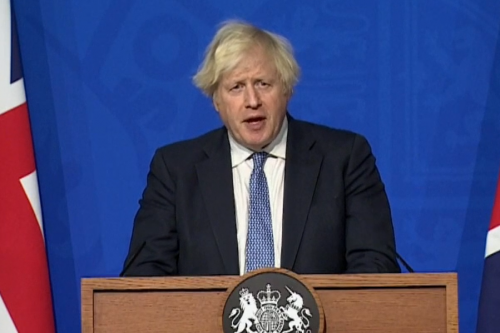Prime Minister Boris Johnson quits

Prime Minister Boris Johnson has resigned after Tuesday’s senior Cabinet resignations snowballed into dozens of ministerial departures.
Chancellor Rishi Sunak and Health Secretary Sajid Javid quit on Tuesday evening and since then almost 60 Conservative ministers and Parliamentary Private Secretaries had followed.
They included levelling-up ministers Neil O’Brien and Kemi Badenoch, treasury minister John Glen, and housing minister Stuart Andrew as MPs from all sides of the party made their displeasure clear. Meanwhile, on Wednesday evening, Levelling Up Minister, Michael Gove, was sensationally sacked.
After trying to hold onto his office throughout Wednesday, Johnson was hit by more resignations this morning – including education secretary Michelle Donelan, who was appointed on Tuesday – and he has now agreed to stand down.
Wednesday’s departures came either side of a bruising Prime Minister’s Questions and a statement by Javid to a packed House of Commons in which he encouraged Conservative MPs to force a change of leader.
Javid said: “I have concluded that the problem starts at the top, and I believe that is not going to change. And that means it is for us who have a position of responsibility to make that change.”
Johnson also faced the Liaison Committee in the afternoon where he sought to present a business-as-usual approach while outside the room junior ministers and his authority were ebbing away, and a delegation of senior ministers, reportedly including his new Chancellor Nadhim Zahawi, were preparing to tell him his time was up.
Johnson has been in office for just under three years and large parts of that have been spent surrounded by speculation about his ability to remain as Prime Minister, culminating in last month’s vote of no confidence.
The uncertainty has been despite Johnson leading his party to an unexpected 80-seat majority in December 2019’s general election that was attributed to his personal connection with voters, and his repeated contention that he had “got Brexit done”.
The UK will soon have its fourth Prime Minister in just over six years since the Brexit referendum – a rate of change not seen since the 1970s.
It will also be the first time that one party has provided four consecutive Prime Ministers since Sir Winston Churchill, Sir Anthony Eden, Harold Macmillan and Sir Alec Douglas-Home were in Number 10 between 1951 and 1964.
East Midlands Chamber chief executive Scott Knowles said: “One of the main purposes of Government should be to provide a stable environment for businesses to thrive – enabling them to create the jobs and life opportunities that underpin a successful country.
“But the paralysis of the past few days, with whole departments being effectively rudderless, heaps further uncertainty on firms at a time when they are already trying to navigate stormy waters.
“The insular focus within Westminster is diverting attention away from the everyday business of Government, in which the mission of creating economic prosperity in regions such as the East Midlands should be high on the priority list.
“We need to know what the plans are for levelling up and tackling the very real cost of doing business crisis, which is hampering firms’ ability to breathe life into an ailing economy.
“Big policy agendas are in a state of stasis. What’s important now is to have a clear path forward so that businesses can have confidence the big issues are going to be tackled.”
Walid Koudmani, chief market analyst at financial brokerage, XTB, said: “The resignation of Boris Johnson as UK PM will breath a sigh of relief for UK investors as it curtails the uncertainty of a government in name only. We saw some instant buying in the GBP which gained against the Euro as investors reacted to the news of his impending resignation. Make no mistake however, the GBP remains severely weak due to the dire state of the UK economy which is underperforming its peers, likely to enter into a recession while the Bank of England refuses to hike interest rates aggressively to deal with the escalating inflation. The new Prime Minister – whoever that is – has a massive job on their hands.”









